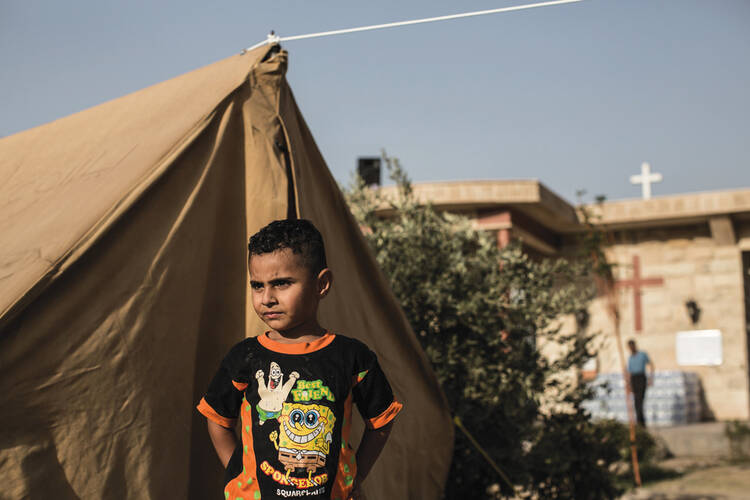In a blunt assessment of the Iraqi government’s response to the suffering of Christians from the northern Nineveh province, a leading Chaldean Catholic bishop said, “Our people have been abandoned.”
The Chaldean Archbishop of Erbil, Bashar Warda, blasted both the Iraqi government and local and regional Muslim leaders not only for their lack of material support to Christians following the vast dislocation of the community in flight from ISIS militants over recent months, but also for their unwillingness to explicitly condemn the repression of Christians by fellow Muslims.
“Christians have received no support from the central government,” Archbishop Warda said in an interview with the international Catholic charity Aid to the Church in Need on Oct. 7. “They have done nothing for them, absolutely nothing.” More than 120,000 Christians have fled ancient Christian communities terrorized by the extremists and escaped into northern Iraq’s Kurdistan region. Regrettably, the threat from ISIS fighters has followed them even into this regional sanctuary.
Archbishop Warda said displaced Christians in his diocese and the nearby Dohuk region are becoming increasingly concerned about their future two months after being forced to abandon their homes and all their belongings in Mosul and the Nineveh Plains. “The central government is to blame,” he said. “It has not fulfilled its commitment to the people. The government in Baghdad received a lot of help from the international community for the displaced people from Mosul and Nineveh—but there has been no sign of it here.” He charged that Baghdad was helping displaced Muslims but not Christians.
The archbishop also complained that Iraqi Muslim leaders have thus far failed to unequivocally condemn the violence carried out in the name of Islam and the ejection of all Christians from their ancient biblical homeland. Archbishop Warda said, “The crisis that has hit Christians from Mosul and Nineveh is not just a shock. It is for us genocide. All voices have acknowledged that this is a crime against humanity.”
A U.N. report issued on Oct. 2 would seem to support the bishop’s grim assessment. According to a report of the U.N. High Commissioner for Human Rights, the struggle in northern Iraq finds that “gross human rights abuses and acts of violence of an increasingly sectarian nature, committed by armed groups, have exacerbated the effect on civilians and contributed to the deterioration in the human rights situation and the rule of law, in many parts of the country.”
U.N. investigators say, “Members of Iraq’s diverse ethnic and religious communities, including Turkmen, Shabak, Christians, Yezidi, Sabaeans, Kaka’e, Faili Kurds, Arab Shi’a, and others have particularly been affected by the situation. [ISIS] and associated armed groups intentionally and systematically targeted these communities for gross human rights abuses, at times aimed at destroying, suppressing or cleansing them from areas under their control.”
Citing instances of long-time Muslim neighbors looting the homes of fleeing Christians, Archbishop Warda said many of his faithful felt “betrayed” and were now more likely to try to leave Iraq. Archbishop Warda, together with other bishops, has coordinated a relief program of food and emergency housing for the displaced people. He said the task of aiding Christians had fallen almost exclusively to the church.
The United Nations reports that at least 8,493 civilians were killed and 15,782 were wounded in Iraq during the first eight months of 2014 but cautions “the actual numbers could be much higher.” As of August 2014, the United Nations estimates that 1.8 million Iraqis had been displaced.








